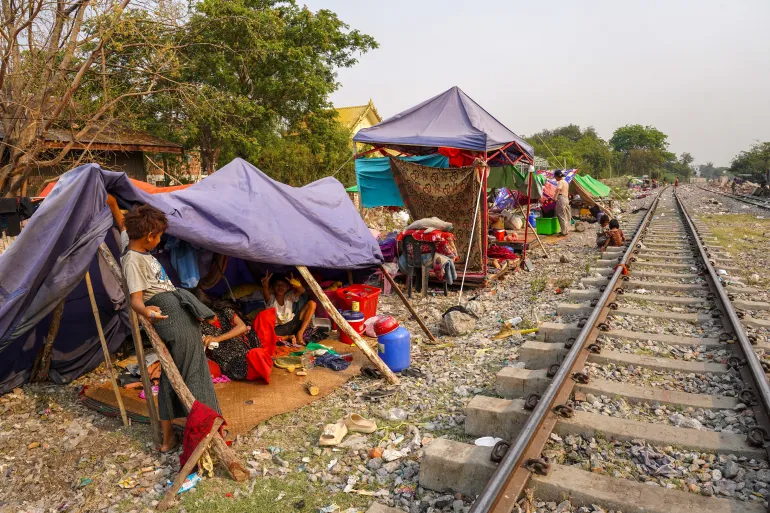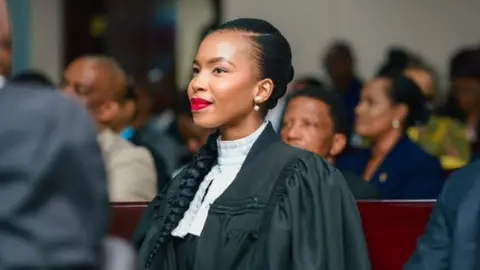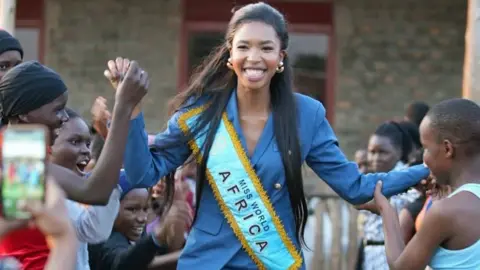Foreign News
Rains add to misery in quake-hit Myanmar as death toll rises to 3,471

Heavy rains have lashed parts of earthquake-hit Myanmar, complicating relief efforts and raising the risk of disease as the death toll from the powerful quakes that struck the country on March 28 rose to at least 3,471.
Aid workers in the hard-hit city of Mandalay, near the epicentre of the earthquake, said on Sunday that rains and winds hit tent camps in the area overnight and in the morning, soaking survivors and their belongings.
More bouts of rain were expected later in the day, while temperatures were also forecast to climb to 37 degrees Celsius (98 degrees Fahrenheit).
“The weather is very extreme,” Tun Tun, a specialist with the United Nations Development Programme, told the AFP news agency.
Aid agencies have warned the combination of unseasonable rains and extreme heat could cause outbreaks of disease, including cholera, among quake survivors, who are camping in the open.
The magnitude 7.7 earthquake hit a wide swath of Myanmar, home to 50 million people, causing significant damage to six regions and states, including the capital, Naypyidaw.
It left many areas without power, telephone or mobile phone connections, and damaged roads and bridges, making the full extent of the devastation hard to assess. It also worsened an already dire humanitarian crisis triggered by the country’s civil war that has internally displaced more than three million people and left nearly 20 million in need, according to the UN.
State media in the military-led country now say the earthquake has caused 3,471 deaths and injured 4,671 people, while 214 remain missing.
It has damaged some 5,223 buildings, 1,824 schools, 4,817 pagodas and temples, 167 hospitals and clinics, 169 bridges, 198 dams and 184 sections of the country’s main highway.

Damage has been particularly severe in the city of Sagaing near the epicentre, as well as in Mandalay, Myanmar’s second-largest city.
UN aid chief Tom Fletcher, who is in Mandalay, described the scale of the damage as “epic” and said survivors, who are “traumatised and fearful”, need food, water, shelter and electricity urgently.
In a video posted to X, Fletcher noted the quake had brought devastation to communities that were already in crisis. “It’s a compounding crisis,” he said. “It’s earthquake, on top of conflict, on top of huge existing need.”
[Aljazeera]
Features
‘Proud to be young’ – Beauty queen, lawyer and Botswana’s youngest cabinet minister

Lesego Chombo‘s enthusiasm for life is as infectious as her achievements are impressive: she has won the Miss Botswana 2022 and Miss World Africa 2024 crowns, is a working lawyer, has set up her own charitable foundation – and made history in November, becoming Botswana’s youngest cabinet minister.
She was just 26 years old at the time – and had clearly impressed Botswana’s incoming President Duma Boko, whose Umbrella for Democratic Change (UDC) had just won a landslide, ousting the party that had governed for 58 years.
It was a seismic shift in the politics of the diamond-rich southern African nation – and Boko, a 55-year-old Harvard-trained lawyer, hit the ground running.
His main focus, he said, was fixing an economy too reliant on diamonds, telling the BBC ahead of his innauguration that he wanted young people to be the solution – “to become entrepreneurs, employ themselves and employ others”.
Key to this was finding a suitable ambassador – and Chombo was clearly it: a young woman already committed to various causes.
He made her minister of youth and gender.
“I’ve never been more proud to be young,” she told the BBC at the ministry’s headquarters in the capital, Gaborone.
“I’m a young person living in Botswana, passionate about youth development, gender equality, but also so passionate about the development of children.”
The beauty queen did not campaign to be an MP – she is what is called a specially elected member of parliament – and is now one of just six female MPs in the 69-member National Assembly.
Chombo said becoming an MP and then minister came as a complete surprise to her.
“I got appointed by a president who had never met me,” she said.
“Miss World and the journey that I thought I was supposed to pursue as my final destination was only the platform through which I would be seen for this very role.”
It was her crowning as Miss Botswana in 2022 that raised her profile and enabled her to campaign for social change, while trying to inspire other young women.
It also gave her the opportunity to set up the Lesego Chombo Foundation, which focuses on supporting disadvantaged youngsters and their parents in rural areas – and which she is still involved with, its projects funded by corporate companies and others.
“We strive to have a world where we feel seen and heard and represented. I’m very thrilled that I happen to be the very essence of that representation,” she said.

As she prepared for last year’s Miss World pageant, she said: “I really put myself in the zone of service. I really channelled it for this big crown.”
Now in political office, she is aware of the expectations placed on her in a country where approximately 60% of the population is below 35 years.
It also has a high level of unemployment – 28%, which is even higher for young people and women who have limited economic opportunities and battle systemic corruption.
Chombo said this was something she was determined to change: “Currently in Botswana, the rates of unemployment are so high.
“But it’s not just the rate of unemployment, it’s also just the sphere of youth development.
“It’s lacking, and so my desire is to create an ecosystem, an environment, a society, an economy in which youth can thrive.”
Chombo said her plan was to develop a comprehensive system that nurtured youth-led initiatives, strengthened entrepreneurship and ensured young people had a seat at the table when decisions were being made.
With Botswana’s anti-corruption policy undergoing a rigorous review, she said this would ensure that quotas for young entrepreneurs – when state departments and agencies put out tenders for goods and services – were actually reached.
The government has begun a 10-month forensic audit of government spending that will include 30 state-owned enterprises.
Indeed President Boko is intent on cracking down on corruption, seeing this as a way to bolter investor confidence and diversify the economy – something his deputy has been seeking to do on recent trips to the United Arab Emirates (UAE) and Switzerland.
And a key deal has now been secured with UAE-based CCI Global, a provider of business process outsourcing, to open a hub in Botswana.
While youth development is a central pillar of her work, gender equity also remains close to her heart.
Her short time in office has coincided with a growing outcry over gender-based violence.
According to a United Nations Population Fund (UNFPA) report, over 67% of women in Botswana have experienced abuse, more than double the global average.
“It hurts to know that it could be me next,” she admitted.
A month into her appointment, she was criticised for voting against an opposition motion in parliament to create “peace desks” at police stations and magistrate courts to quickly deal with victims.
At the time she said such provisions already existed within the law and what was needed was more public awareness.
This was followed in January by a police report noting that at least 100 women had been raped and another 10 murdered during the festive season – this caused public outrage with many lashing out at her on social media over the issue.
The minister reiterated – on several occasions, including before parliament in March – that Botswana had many laws and strategies in place and what was important was to ensure these they were actually applied.
But she told the BBC the government would be pushing for the implementation of a Gender-Based Violence Act, aimed at closing legal loopholes that have long hindered justice for survivors.
She said she was also advocating a more holistic approach, involving the ministries of health, education and local government.
“We want curriculums that promote gender equity from a young age,” Chombo said.
“We want to teach children what gender-based violence is and how to prevent it.
“It will boil down to inclusion of teaching gender equity at home, how parents behave around their children, how they model good behaviour.”

She has also been vocal about the need to address issues affecting men, particularly around mental health and positive masculinity, encouraging chiefs “to ensure that our patriarchal culture is not actively perpetuating gender violence”.
“I hear a lot of people say: ‘Why do you speak of women more than men?’
“It’s because as it stands in society, women are mostly prejudiced [against].
“But when we speak of gender equality, we’re saying that it should be applied equally for everyone. But what we strive for is gender equity.”
Chombo, who studied law at the University of Botswana, said she was thankful to her mother and other strong women for inspiring her – saying that women had to work “10 times harder” to succeed.
“[My mother] has managed to create an environment for me to thrive. And growing up, I got to realise that it’s not an easy thing.
“As women, we face so many pressures: ‘A woman cannot do this. A woman can’t do that. A woman can’t be young and in leadership.’ I’m currently facing that.”
She also credited Julia Morley, the CEO of Miss World, for helping her: “She has managed to create a legacy of what we call beauty with a purpose for so many young girls across the world.
“She has just inspired us so deeply to take up social responsibility.”
Chombo is serious about this. The beauty queen-cum-lawyer-cum-minister knows she has made history – but is also aware that her real work has only just begun.
“Impact. Tangible impact. That’s what success would look like to me,” she said.
“I want to look back and see that it is there and it is sustainable. That when I leave, someone else is able to carry it through.”
[BBC]
Foreign News
Pope Leo prays at tomb of Francis ahead of first Sunday address

Pope Leo XIV will give his first Sunday blessing and address to a crowd in St Peter’s Square in the Vatican today.
He will recite the Regina Caeli prayer, in honour of the Virgin Mary, in his first public address since his election was announced with white smoke on Thursday.
After delivering Sunday mass, Pope Leo will bless those gathered on the square outside – and deliver his reflections.
On Saturday, he visited a shrine outside Rome and then prayed before the tomb of his late predecessor Francis inside the basilica of Santa Maria Maggiore.
Pope Leo will be formally inaugurated at a mass in St Peter’s Square next week on 18 May.
[BBC]
Foreign News
India and Pakistan accuse each other of ‘violations’ after ceasefire deal

India and Pakistan have accused each other of “violations” hours after the two nations said they had agreed to a ceasefire following days of cross-border military strikes.
After sounds of explosions were heard in Indian-administered Kashmir, India’s Foreign Secretary Vikram Misri said there had been “repeated violations of the understanding we arrived at”.
A short while later, Pakistan’s foreign ministry said it remained “committed to faithful implementation of a ceasefire…notwithstanding the violations being committed by India in some areas”.
The fighting between India and Pakistan over the last four days has been the worst military confrontation between the two rivals in decades.
The use of drones, missiles and artillery started when India struck targets in Pakistan and Pakistan-administered Kashmir in response to a deadly militant attack in Pahalgam last month. Pakistan had denied any involvement.
After four days of cross-border strikes, India and Pakistan said they had agreed on a full and immediate ceasfire.
US President Donald Trump announced the news on his Truth Social Platform on Saturday morning. He said it had been brokered by the US.
Pakistan’s Foreign Minister later confirmed the agreement had been reached by the two countries, adding that “three dozen countries” were involved in the diplomacy.
But hours after the announcement, residents – and BBC reporters – in the main Indian-administered Kashmiri cities of Srinagar and Jammu reported hearing the sounds of explosions and seeing flashes in the sky.
Indian Foreign Secretary Vikram Misri said: “For the last few hours, there have been repeated violations of the understanding we arrived at earlier this evening.
“This is a breach of the understanding arrived at earlier today.”
Misri said India’s armed forces was “giving an appropriate response” and he concluded his briefing by “calling upon Pakistan to address these violations”.
In response, a spokesman for Pakistan’s Ministry of Foreign Affairs said: “Pakistan remains committed to faithful implementation of ceasefire between Pakistan and India, announced earlier today.
“Notwithstanding the violations being committed by India in some areas, our forces are handling the situation with responsibility and restraint.
“We believe that any issues in smooth implementation of the ceasefire should be addressed through communication at appropriate levels.
“The troops on ground should also exercise restraint.”
Kashmir is claimed in full by India and Pakistan, but administered only in part by each since they were partitioned following independence from Britain in 1947.
It has been a flashpoint between the two nuclear-armed nations and they have fought two wars over it.
Confirming the ceasefire, India’s external affairs minister S Jaishankar said the two nations had “worked out an understanding on stoppage of firing and military action”.
“India has consistently maintained a firm and uncompromising stance against terrorism in all its forms and manifestations. It will continue to do so,” he added.
Later, in an address to the nation, Pakistan Prime Minister Shehbaz Sharif said the ceasefire had been reached “for the benefit of everybody”.
Speaking after the ceasefire announcement, US Secretary of State Marco Rubio said India and Pakistan had agreed to start talks on a broad set of issues at a neutral site.
He said he and US Vice-President JD Vance had spent 48 hours with senior Indian and Pakistani officials, including their respective Prime Ministers Narendra Modi and Shehbaz Sharif.
UN Secretary General Antonio Guterres said he welcomed “all efforts to de-escalate the conflict”.
UK Prime Minister Sir Keir Starmer said Britain has been “engaged” in talks for “some days”, with Foreign Secretary David Lammy speaking to both sides.
“I’m pleased to see today that there’s a ceasefire,” Sir Keir said. “The task now is to make sure that that is enduring and is lasting.”
The recent fighting came after two weeks of tension following the killing of 26 tourists in the resort town of Pahalgam.
Survivors of the 22 April attack in Indian-administered Kashmir, which killed 25 Indians and one Nepali national, said the militants were singling out Hindu men.
The Indian defence ministry said its strikes this week were part of a “commitment” to hold “accountable” those responsible for the attack. Pakistan described them as “unprovoked”.
Pakistan said Indian air strikes and cross-border fire since Wednesday had killed 36 people in Pakistan and Pakistan-administered Kashmir, while India’s army reported at least 21 civilians deaths from Pakistani shelling.
Fighting intensified overnight on Friday, with both countries accusing each other of targeting airbases and other military sites.
[BBC]
-

 Business6 days ago
Business6 days agoAitken Spence Travels continues its leadership as the only Travelife-Certified DMC in Sri Lanka
-

 Latest News5 days ago
Latest News5 days agoNPP win Maharagama Urban Council
-

 Business6 days ago
Business6 days agoLinearSix and InsureMO® expand partnership
-

 Business4 days ago
Business4 days agoJohn Keells Properties and MullenLowe unveil “Minutes Away”
-

 Sports20 hours ago
Sports20 hours agoASBC Asian U22 and Youth Boxing Championships from Monday
-

 Features20 hours ago
Features20 hours agoSAITM Graduates Overcome Adversity, Excel Despite Challenges
-

 Foreign News2 days ago
Foreign News2 days agoMexico sues Google over ‘Gulf of America’ name change
-

 News20 hours ago
News20 hours agoDestined to be pope:Brother says Leo XIV always wanted to be a priest












